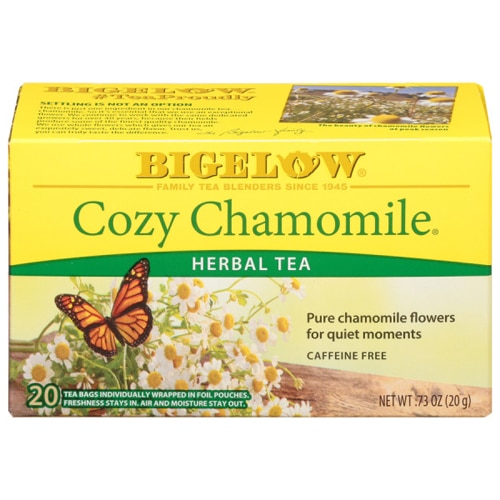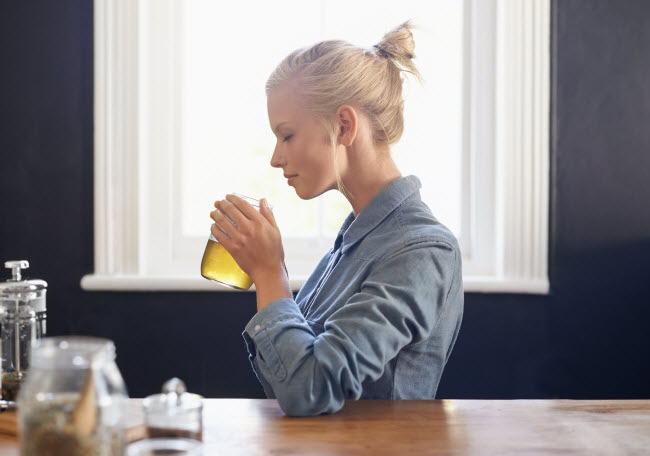Finding calm can occasionally feel like a major feat—particularly if you’re besieged with a significant life change such as death, divorce or a career change. Even quotidian stress—the sort that arises from either an identifiable source or for no apparent reason—can make everyday tasks feel monumental and result in symptoms ranging from generalized agitation and nervousness to a faster heart rate and insomnia. Tack on low blood sugar, hormone and brain chemical imbalances, and illness, and discovering sanity, let alone achieving serenity, may seem downright impossible.
While chronic anxiety ought to be addressed by your health care professional, there are a number of at-home tricks you can try to settle down—and naturally. Indeed, aside from taking care of yourself in the most critical realms—with nutritious food, adequate sleep, regular exercise, proper hydration, and social engagement—Mother Earth offers a cornucopia of natural anxiety remedies. The following six herbs, called “nervines,” are taken from her abundant basket—and may nourish the nervous system and encourage that sense of calm you’re after:
Wood betony
This Native European perennial has long been used for a variety of health reasons, even dating back to the Middle Ages when it was worn as amulet to stave off evil. Early Romans, meanwhile, praised wood betony as a remedy for 47 maladies. Fast-forward to the 21st century and it’s called upon to naturally promote sounder sleep and soothe anxiety. One theory on its efficacy stems from a Russian study that revealed that betony “contains a mixture of glycosides, which showed some effect in lowering blood pressure,” reports the authors of Rodale’s Illustrated Encyclopedia of Herbs. Others claim that the ancient herb can quiet a monkey mind—thus helping you get back into your body.†
Chamomile
Physical restlessness and an agitated mind can be two of the most frustrating side effects of anxiety. You want—or even need—to take action, but those endless, looping thoughts, racing heart and twitching legs are proving to be substantial hindrances. Enter chamomile. The favorite of tea-drinkers contains volatile oils (such as bisbolol) and flavonoids (such as apigenin) that may offer calm, including a better night’s sleep.†
Passionflower
The chemicals in this southeastern United States, Central and South American vine have been shown to have "calming, sleep inducing, and muscle spasm-relieving effects", WebMD reports. A study put out by Phytotherapy Research demonstrated that participants who drank passionflower tea testified to improvements in their sleep, while the National Institutes of Health found that passiflora extract may offer benefits for "generalized anxiety disorder.” In other words? Add this gentle sedative to your list of herbs to consider.†
Bleu vervain
Another common complaint of anxiety? Headaches! Muscle contractions and spasms may lead to sharp pains and dull aches between your ears—which, on top of it all, is one of the last things you want to deal with. The next time it happens, consider reaching for blue vervain. Technically known as Verbana hastate, extracts from this small, purple flower have been used for thousands of years for health-promoting purposes, thanks to its inclusion of potentially-therapeutic phytochemicals. These naturally support the nervous system and may provide relief from headaches; the herb itself also has calming effects.†
Lemon balm
Fast-growing and prevalent around the globe, lemon balm has long been advocated as a means of support for sleeplessness and anxiety. A member of the mint family—and also called “common balm” and “balm mint”—it can stimulate a lightly-sedative effect, ease anxiety, and foster sleep. Small laboratory trials demonstrate that this may due to chemicals in lemon balm that are considered “calmative.” What’s more, lemon balm may organically encourage digestion—which tends to take a hit when stress is at its peak.†
Lavender
Is there any wonder why lavender is often many-a-spa’s signature scent? With its lulling, lovely fragrance (and the calm that alone evokes), lavender’s famed reputation for inviting tranquility is well-deserved—and then some. While the Mayo Clinic reports that evidence on lavender’s ability to assist with anxiety is preliminary (and, as such, limited), other evidence reveals that it can be a boon for reducing anxiety—including a study out of NIH showing that the herb can produce a calming effect without sedation. To phrase it differently, consider this mauve beauty the perfect solution when you need a dose of peace but still need to be at your sharpest. As with all the herbs listed here, lavender can be used as a tea, tincture or essential oil—but with this one especially you may want to breathe deep.†
†These statements have not been approved by the Food and Drug Administration. These products are not intended to diagnose, treat, cure or prevent disease.




